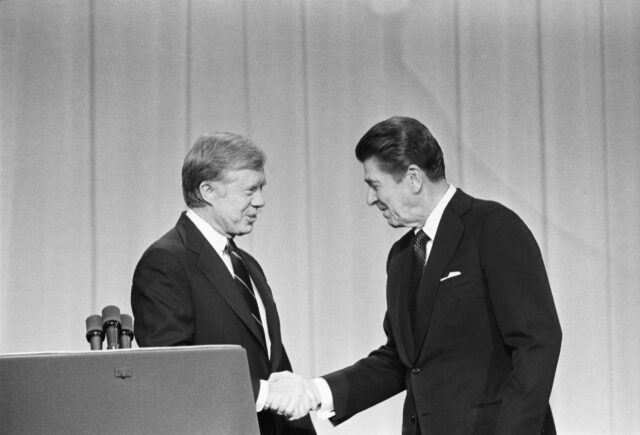Jimmy Carter crossed the century threshold on Tuesday, turning 100 years old — something no other U.S. president has ever done.
Carter’s presidency was marred by many policy errors, both domestic and foreign. Perhaps none was as consequential as inflation, which rose to the highest level ever recorded in modern American history and went unchallenged until the surge of inflation under the Biden-Harris administration.
Ironically, Carter owed his presidency to inflation. It was the number one issue facing the country in 1976, according to the 1976 Gallup polls. Under Richard Nixon and the burden of the Vietnam War and Lyndon Johnson’s Great Society programs, it had soared to 12 percent by the end of 1974. By the time of the 1976 election, it had fallen to five percent but the public was still very unhappy with the rise in the cost of living. Going into the election, Carter enjoyed a twenty point advantage on the issue of inflation.
In the early months of the Carter administration, inflation began to rise again and would climb relentlessly for the next four years, hitting 14.6 percent in 1980. No surprisingly, the Gallup surveys show that inflation was again the number one issue for Americans in the 1980 election—but this time Carter’s advantage on the issue had evaporated to zero. According to a New York Times/CBS News poll, 40 percent of the country named inflation as their top concern—more than twice as many as the runner up, energy.

In a famous 1978 address to the nation, Carter described an anti-inflation program. He argued that deficit reduction was the key to reducing inflation, saying that “the government has been spending too great a portion of what our nation produces.”
That likely resonated with a lot of voters. But Carter went on to argue against tax cuts, saying they would increase inflation.
Here’s how Peter Suderman, of Reason magazine, described the 1980 debate between Reagan and Carter:
When Carter eventually faced Reagan in a head-to-head debate, just days before the 1980 election, the issue inevitably arose. Carter was asked about the rapid rise in inflation during his tenure, with increases in the Consumer Price Index jumping from 4.8 percent in 1976 to more than 12 percent in 1980. “Can inflation,” the moderator wondered, “in fact be controlled?”
Carter dodged and deflected, blaming OPEC for raising oil prices and defending his lackluster economy on the grounds that “the recession that resulted this time was the briefest we’ve had since the Second World War.” Plus, he said, job creation was strong, with 9 million new jobs. He insisted that Reagan’s plan to cut income taxes could result in a 30 percent inflation rate. And, in a follow-up, he returned to the old idea that it was the economic indulgences of the American people that were most relevant to rising prices. “We have demanded that the American people sacrifice,” he said.
When Reagan got a chance to answer a version of the same question, he flipped Carter’s response: “I think this idea that has been spawned here in our country, that inflation somehow came upon us like a plague and therefore it’s uncontrollable and no one can do anything about it, is entirely spurious,” he said. He noted Carter’s broken promises on the economy, cited the millions of Americans still out of work, and rebuked the president for trying to escape blame. Carter, Reagan said, had blamed “the people for inflation, OPEC, he’s blamed the Federal Reserve System, he has blamed the lack of productivity of the American people, he has then accused the people of living too well and that we must share in scarcity, we must sacrifice and get used to doing with less. We don’t have inflation because the people are living too well. We have inflation because the government is living too well.”
Carter was the only elected president whose presidency was undone by inflation. His longevity, however, allowed him to see a second Democratic president, Joe Biden, also lose the confidence of the American people due to inflation.
With inflation once again riding high in the minds of many Americans, Kamala Harris may be a successor to the legacy of political leaders turned out of office by a decline in the value of the currency and soaring costs of living.

COMMENTS
Please let us know if you're having issues with commenting.